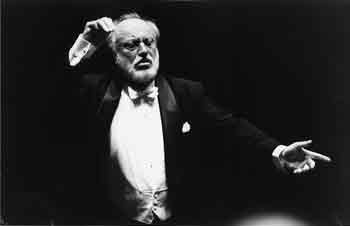Masur Shines in Brahms with NSO
 Kurt Masur (b. 1927), conductor |
| Brahms Requiem: C. Oelze, G. Finley, Orchestre des Champs-Élysées, P. Herreweghe A. Auger, R. Stilwell, Atlanta Symphony Orchestra and Chorus, R. Shaw |
The second half was (coincidentally) an anniversary performance of the choral masterwork Ein deutsches Requiem, op. 45, premiered (for the second time, with six of the seven movements Brahms eventually composed) on April 10, 1868 (by another coincidence, when it was also Good Friday), in Bremen. People generally either love or hate the music of Brahms, and indeed more than one friend (including professional choir singers) reacted to the offer to be my guest at this concert with a roll of the eyes. What made this performance so pleasing to my ears was, once again, incisive conducting from Masur, with crisp, unexpected tempos, often on the fast side (like the imposing death march of Denn alles Fleisch), cutting away the fat heard so often in soupy renditions like that of Robert Shaw (on which many American choral singers, myself included, are nursed). Masur often had to be insistent, in fact, to keep the amassed voices of the Master Chorale of Washington, in its penultimate performances before disbanding because of lack of funds, in line with his surging beat.
Philip Kennicott, In a Requiem Played Like This, the Dead Have It Easy (Washington Post, April 10) |
This concert will be repeated this evening (April 11, 8 pm). Next week's concerts by the National Symphony Orchestra will feature Leonidas Kavakos playing two of the big Romantic violin concertos, by Mendelssohn (April 16 and 18) and Tchaikovsky (April 17). Iván Fischer will conduct, and the program will also include Tchaikovsky's fifth symphony and a new work by Colorado composer Daniel Kellogg.




















































1 comment:
Thank you very much for your very insightful review.
After reading Phillip Kennicott insulting remarks at the Washington Post,I was wondering if we were at the same concert.
It is always a privilege to hear Kurt Masur conduct.
Post a Comment